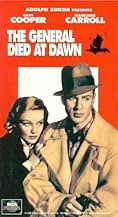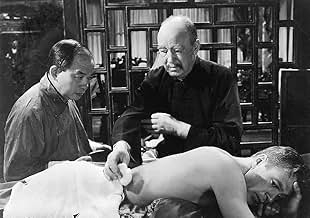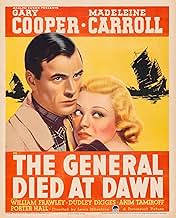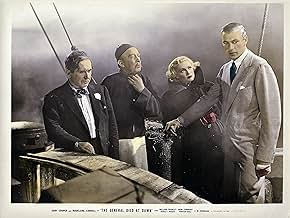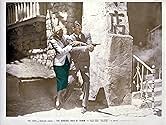AVALIAÇÃO DA IMDb
6,4/10
1,4 mil
SUA AVALIAÇÃO
Adicionar um enredo no seu idiomaAmid the anarchy of China, an American mercenary tangles with a ruthless warlord.Amid the anarchy of China, an American mercenary tangles with a ruthless warlord.Amid the anarchy of China, an American mercenary tangles with a ruthless warlord.
- Direção
- Roteiristas
- Artistas
- Indicado a 3 Oscars
- 1 vitória e 3 indicações no total
Lee Tong Foo
- Mr. Chen
- (as Lee Tung-Foo)
Hans Fuerberg
- Yang's Military Advisor
- (as Hans Furberg)
Irene Bennett
- Passenger
- (não creditado)
Spencer Chan
- Killer
- (não creditado)
Thomas Chan
- Houseboy
- (não creditado)
- Direção
- Roteiristas
- Elenco e equipe completos
- Produção, bilheteria e muito mais no IMDbPro
Avaliações em destaque
The scene in the train where femme fatal Judy Perrie seduces O'Hara is a masterpiece of steamy sensuality. Carroll's silky-smooth alabaster skin and flaxen hair, gorgeously highlighted by her exquisitely outlined lips and eyes, were masterfully exploited by director Lewis Milestone and some extremely skilled cameramen, as her feminine delights proved too much for the otherwise unswervingly steadfast O'Hara. Throughout, the curiously uneven script takes a decided turn for the better, with both participants delivering some highly suggestive verbal exchanges, brimming with innuendo and wit, culminating with O'Hara mockingly asking Judie if he can kiss her, only to receive in return the playful reply that he must first ask her mother. He then looks into the neighboring compartment and makes the request in mock earnestness, for there is no Mrs. Perrie! All the while, the sinister war lord General Yang and his dark forces are preparing to intercept the train, "relieve" O'Hara of the funds he's set to deliver to Mr. Wu for the sole purpose of ridding the province of the scurrilous Yang. Let your imaginations soar, esteemed classic film buffs, for this is truly great film-making.
Between masterworks such as "All Quiet on the Western Front" (1930) and "The Strange Love of Martha Ivers" (1945) the Moldovan born Lewis Milestone had a mixed career. He made a bunch of good movies, a bunch of bad ones, and several bunches of films that have just been forgotten. Somewhere in here we also encounter "The General Died at Dawn" (1936), an interesting adventure film set in China. The film features the first screenplay by Clifford Odets, then one of the hottest playwrights around. Even though the film boasts a charismatic ensemble of actors, it often feels like the real star here is the screenplay.
The movies opens very strong. We are introduced to the plight of the poor Chinese, who struggle against a ruthless warlord General Yang, played by Akim Tamiroff in an Oscar-nominated role. Gary Cooper is our idealist hero, a guy who could never catch an even break, and is now trying to give the Chinese one. Coop is something of a spy, carrying important money shipment to the people fighting Yang, but unfortunately Yang has his own spies and is very much on to him...
I would go as far as to call the first half an hour (or so) of this film a masterpiece. Coop is introduced wonderfully, he has a monkey named Sam as a sidekick, and the whole train sequence, featuring the female lead Madeleine Carroll, and eventually Tamiroff as Yang, is wonderfully written. The suspense of the narrative feels real, but the screenplay also has time to be witty and funny. Cooper gets great lines, and throws a few unexpected (yet so enjoyable) punches around as well. I laughed a bunch and was rooting for the hero, rooting for the film really.
Unfortunately after the first third of the film, the narrative takes several missteps. All the important characters go their different ways for too long of a period, and by the time they are all in the same space again, the film has lost its momentum. The ending is not bad, but it is nothing breathtaking either. The film also runs into some trouble, when it can't quite decide, how it wants to portray General Yang and his men.
Still, I would very much recommend this to fans of classic Hollywood. Cooper gets a really good role as our hero, and Tamiroff is very memorable as Yang. Tamiroff was originally Armenian, so in Hollywood-land, that will have to pass as Chinese. I do, however, seriously wish they hadn't turned poor Dudley Digges into Mr. Wu. That was a bit cringe-worthy.
The movies opens very strong. We are introduced to the plight of the poor Chinese, who struggle against a ruthless warlord General Yang, played by Akim Tamiroff in an Oscar-nominated role. Gary Cooper is our idealist hero, a guy who could never catch an even break, and is now trying to give the Chinese one. Coop is something of a spy, carrying important money shipment to the people fighting Yang, but unfortunately Yang has his own spies and is very much on to him...
I would go as far as to call the first half an hour (or so) of this film a masterpiece. Coop is introduced wonderfully, he has a monkey named Sam as a sidekick, and the whole train sequence, featuring the female lead Madeleine Carroll, and eventually Tamiroff as Yang, is wonderfully written. The suspense of the narrative feels real, but the screenplay also has time to be witty and funny. Cooper gets great lines, and throws a few unexpected (yet so enjoyable) punches around as well. I laughed a bunch and was rooting for the hero, rooting for the film really.
Unfortunately after the first third of the film, the narrative takes several missteps. All the important characters go their different ways for too long of a period, and by the time they are all in the same space again, the film has lost its momentum. The ending is not bad, but it is nothing breathtaking either. The film also runs into some trouble, when it can't quite decide, how it wants to portray General Yang and his men.
Still, I would very much recommend this to fans of classic Hollywood. Cooper gets a really good role as our hero, and Tamiroff is very memorable as Yang. Tamiroff was originally Armenian, so in Hollywood-land, that will have to pass as Chinese. I do, however, seriously wish they hadn't turned poor Dudley Digges into Mr. Wu. That was a bit cringe-worthy.
As Universal states, in their nicely packaged DVD set entitled "The Gary Cooper Collection" (2005), the celebrated actor is "a mysterious American soldier of fortune determined to foil the ambition of a ruthless enemy general planning to take over the provinces of Northern China. Exotic settings, captivating performances, and extraordinary cinematography power this thrilling tale of courage in the line of fire."
The story isn't as substantive or engaging as the presentation, but quality certainly permeates the production. "The General Died at Dawn" helped Mr. Cooper become Quigley Publications' "World Box Office" male star of 1936. In beautiful form, Madeleine Carroll (as Judy Perrie) certainly helped. Of five "Best Supporting Actor" possibles, Akim Tamiroff (as General Yang) received the "Oscar" nomination.
****** The General Died at Dawn (9/2/36) Lewis Milestone ~ Gary Cooper, Madeleine Carroll, Akim Tamiroff, William Frawley
The story isn't as substantive or engaging as the presentation, but quality certainly permeates the production. "The General Died at Dawn" helped Mr. Cooper become Quigley Publications' "World Box Office" male star of 1936. In beautiful form, Madeleine Carroll (as Judy Perrie) certainly helped. Of five "Best Supporting Actor" possibles, Akim Tamiroff (as General Yang) received the "Oscar" nomination.
****** The General Died at Dawn (9/2/36) Lewis Milestone ~ Gary Cooper, Madeleine Carroll, Akim Tamiroff, William Frawley
The General Died at Dawn, the title itself is enough of a giveaway as to what happens. But the circumstances leading up to the death of Chinese Warlord Akim Tamiroff is quite a tale.
The setting for this film is Kuomintang China where the government of Chiang Kai-Shek doesn't have its writ run very far. Most of China in the Twenties is controlled by various provincial warlords. In fact a case could be made that the Chinese Communists under Mao Tse-tung was viewed as just another warlord. But that's a whole different story.
American adventurer Gary Cooper has a money belt with a whole lot of cash in it entrusted to him by the opposition faction to Akim Tamiroff. He's supposed to make contact with William Frawley in Shanghai who when he's not drinking the hotel bar dry, runs guns.
But Madeleine Carroll and her father Porter Hall who are working for Tamiroff help Tamiroff part Cooper from his money. In the case of Coop, he's real guilty of thinking with his gonads. Then Porter Hall steals the money for himself and the film gets real interesting.
There's one big flaw in the film, occurring when Madeleine Carroll who starts falling for Cooper, refers to him as the "O'Hara Boy." O'Hara is Cooper's character name. Coop was 35 when this film was made and referring to him as 'boy' was ludicrous. But then again a man of 35 should have been on better guard. Film might have worked better if someone younger like Robert Taylor or Tyrone Power played the part of O'Hara. Or Clifford Odets's script should have given Carroll a more elaborate ruse to play on Cooper.
Two major oriental roles were given to occidental players. Casting like Akim Tamiroff as the warlord Yang and Dudley Digges as Mr. Wu who employs Cooper would never happen today. But both do well and come to think of it Tamiroff does have an oriental strain in his ancestry.
One bit of casting really hits home. By all accounts William Frawley was hardly the lovable tightwad Fred Mertz in real life. He was a misanthropic alcoholic in the tradition of W.C.Fields and a mean drunk when he was loaded which was often back then. His role as Brighton, the misanthropic, mean, and thoroughly racist gunrunner was way closer to the real Bill Frawley.
Gary Cooper in The General Died at Dawn was playing a role that Humphrey Bogart would probably have done in the forties. It was always joked that Cooper's dialog consisted of 'yup' and 'nope.' But the way he gets himself, Carroll and Digges out of a real predicament in the end called for quite a gift of gab.
The setting for this film is Kuomintang China where the government of Chiang Kai-Shek doesn't have its writ run very far. Most of China in the Twenties is controlled by various provincial warlords. In fact a case could be made that the Chinese Communists under Mao Tse-tung was viewed as just another warlord. But that's a whole different story.
American adventurer Gary Cooper has a money belt with a whole lot of cash in it entrusted to him by the opposition faction to Akim Tamiroff. He's supposed to make contact with William Frawley in Shanghai who when he's not drinking the hotel bar dry, runs guns.
But Madeleine Carroll and her father Porter Hall who are working for Tamiroff help Tamiroff part Cooper from his money. In the case of Coop, he's real guilty of thinking with his gonads. Then Porter Hall steals the money for himself and the film gets real interesting.
There's one big flaw in the film, occurring when Madeleine Carroll who starts falling for Cooper, refers to him as the "O'Hara Boy." O'Hara is Cooper's character name. Coop was 35 when this film was made and referring to him as 'boy' was ludicrous. But then again a man of 35 should have been on better guard. Film might have worked better if someone younger like Robert Taylor or Tyrone Power played the part of O'Hara. Or Clifford Odets's script should have given Carroll a more elaborate ruse to play on Cooper.
Two major oriental roles were given to occidental players. Casting like Akim Tamiroff as the warlord Yang and Dudley Digges as Mr. Wu who employs Cooper would never happen today. But both do well and come to think of it Tamiroff does have an oriental strain in his ancestry.
One bit of casting really hits home. By all accounts William Frawley was hardly the lovable tightwad Fred Mertz in real life. He was a misanthropic alcoholic in the tradition of W.C.Fields and a mean drunk when he was loaded which was often back then. His role as Brighton, the misanthropic, mean, and thoroughly racist gunrunner was way closer to the real Bill Frawley.
Gary Cooper in The General Died at Dawn was playing a role that Humphrey Bogart would probably have done in the forties. It was always joked that Cooper's dialog consisted of 'yup' and 'nope.' But the way he gets himself, Carroll and Digges out of a real predicament in the end called for quite a gift of gab.
I was surprised at the low rating for this film at IMDb, 6.7 as of this writing. I found it a very enjoyable film. I'm a sucker for strong, moody visuals, and this film sure has them. In fact, about half way through I began to wonder, with all the shadows and fishing nets, if this were a Von Sternberg film. The script, which some reviewers found too wordy or too preachy, I found very engaging. The pacing was excellent.
Some reviewers have taken offense at the two main Chinese characters being played by occidentals who spoke pigeon English. Well, that's how films were made back then. Sure it seems unfair to modern viewers. It was unfair. Is that reason to trash the whole film? The Asian actors who had speaking roles came across as intelligent and well spoken.
If you're in the mood for some dark, exotic espionage, I definitely recommend this.
Some reviewers have taken offense at the two main Chinese characters being played by occidentals who spoke pigeon English. Well, that's how films were made back then. Sure it seems unfair to modern viewers. It was unfair. Is that reason to trash the whole film? The Asian actors who had speaking roles came across as intelligent and well spoken.
If you're in the mood for some dark, exotic espionage, I definitely recommend this.
Você sabia?
- CuriosidadesThe main character, O'Hara, is based on the real-life adventurer Morris "Two-Gun" Cohen (1887-1970). Born in Poland to a Jewish family, Cohen grew up in the tough streets of London's East End. As a teenager, he moved to western Canada and became a ranch hand and gambler in Saskatchewan, and later a highly successful real-estate agent in Alberta. During World War I he fought in Europe with the Canadian Railway Troops. His friendship with Chinese workers on the Canadian-Pacific Railroad prompted him to go to China in the 1920s. After negotiating a railroad deal with Dr. Yat-sen Sun, Cohen became a personal bodyguard to Sun and a trainer of Sun's private army. After Sun's death in 1925, Cohen ran guns for various Chinese warlords throughout the 1930s. When the Japanese invaded China in 1937, Cohen continued to supply Chinese resistance forces with arms and served with the British SOE. In 1941, following the fall of Hong Kong, he was captured by the Japanese and put in a prison camp, but was traded to the English in 1943 in a rare prisoner exchange. After the war, Cohen continued to operate in China as an agent for various British firms, including Rolls-Royce and Decca Radar. His former dealings with Chinese warlords kept him in good standing with Chinese Communist officials until his death in 1970.
- Erros de gravaçãoWhile arguing with Peter, Judy slams a book down on the desk. A couple of other books on the corner of the desk disappear in a later scene.
- Cenas durante ou pós-créditosThe opening credits all appear on the sails of boats.
- ConexõesFeatured in A Hollywood Vermelha (1996)
Principais escolhas
Faça login para avaliar e ver a lista de recomendações personalizadas
- How long is The General Died at Dawn?Fornecido pela Alexa
Detalhes
- Data de lançamento
- País de origem
- Idioma
- Também conhecido como
- The General Died at Dawn
- Locações de filme
- Empresa de produção
- Consulte mais créditos da empresa na IMDbPro
- Tempo de duração1 hora 38 minutos
- Cor
- Proporção
- 1.37 : 1
Contribua para esta página
Sugerir uma alteração ou adicionar conteúdo ausente

Principal brecha
By what name was O General Morreu ao Amanhecer (1936) officially released in India in English?
Responda
